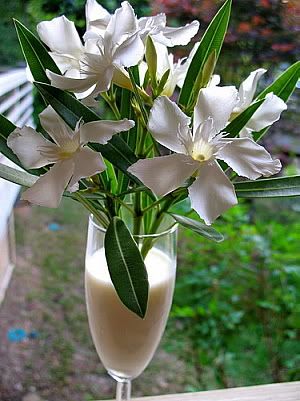Bland Oleander: a Rant/Review

From the film version: imbibing poison is a perfect metaphor for enduring this travesty.
I reread a long-time, all-time favorite book of mine recently. I first read White Oleander at sixteen, at the recommendation of one of my teachers at the time. It still holds up for me: the lyrical prose, the strong characterization, the poetic and vivid imagery throughout. It's got to be one of the single strongest "coming-of-age" stories I've ever read.
So imagine my disgust at finally seeing the horrific film despite warnings from fellow fans of the book who'd seen it.
Adapting a book to film is never going to be an easy or a seamless task. There will always have to be adaptions, but the idea is that it stays true (or as true as it can) to the spirit of the book.
The sparse beauty of Janet Fitch's words gets a Lifetime TV makeover complete with cringe-worthy performances, cut-corners, and none of the magic of the book. Given the nature of the novel, naturally some storylines are going to have to disappear. But dumping the foster home where Astrid, our protagonist, learns the art and religion of survival? The very experience which outlines the entire book and is its central theme? Unforgivable. Also, audiences might not have been able to take Astrid's affair with her first foster father (in the book, a disabled Vietnam vet; in the movie, a muscular 30-something with a proclivity for going shirtless as he works on his truck) despite its impact on the entire plot, so it got sacked, too.
Cartoonish performances abound, especially from Michelle Pfeiffer who manages to turn the richly complex Valkyrie poet Ingrid into a prissy pouting flake. It's agony to hear her deliver her lines, even more so to watch. The fact that the screenplay lifts some dialog directly from the book is even more excruciating. Renée Zellweger stutters a performance as the linchpin Claire but the screenplay has so thoroughly purged the character, we almost barely notice.
Purged completely from the movie is another central character, Olivia Johnstone. Fun Fact: nearly of Astrid's foster moms that were kept in the script got a big ol' bucket of bleach-- the book notes Claire's appearance's exquisite "Audrey Hepburn" resemblance so imagine how well a twittery bleached blond Renée Zellweger fits the ticket. Somehow, the screenwriter felt that maybe the viewer would keep track of Astrid's foster mothers better if they were all platinum blonds (save for the Russian Rena whom they presumably decided had better be a brunette).
It's hard to decide which aspect destroys the book the most: the glaring omissions, the horrible performances, the shoddy characterization, the overall blandness of the cinematography...
One thing is for sure. If the upcoming The Lovely Bones receives the same treatment (and I have much higher hopes as Peter Jackson is directing) White Oleander received, I'm already hurling bricks. How must authors feel when their work is so destroyed? Janet Fitch expressed only gratitude that Oprah gave her book her stamp of approval which helped it become the bestseller that was all but hurried off to Hollywood, I've yet to see a documentation of her reaction to the film. Maybe someday the movie will be remade and finally do justice to the book.
However, there is one marginal saving grace: this is still fiction. If White Oleander was an actual memoir like Girl, Interrupted, the butchery would be all the more blasphemous. I was lucky enough to see the film version of Girl, Interrupted before I read the book and wondered how Susanna Kaysen restrained herself from taking a knife to the "screenwriter".